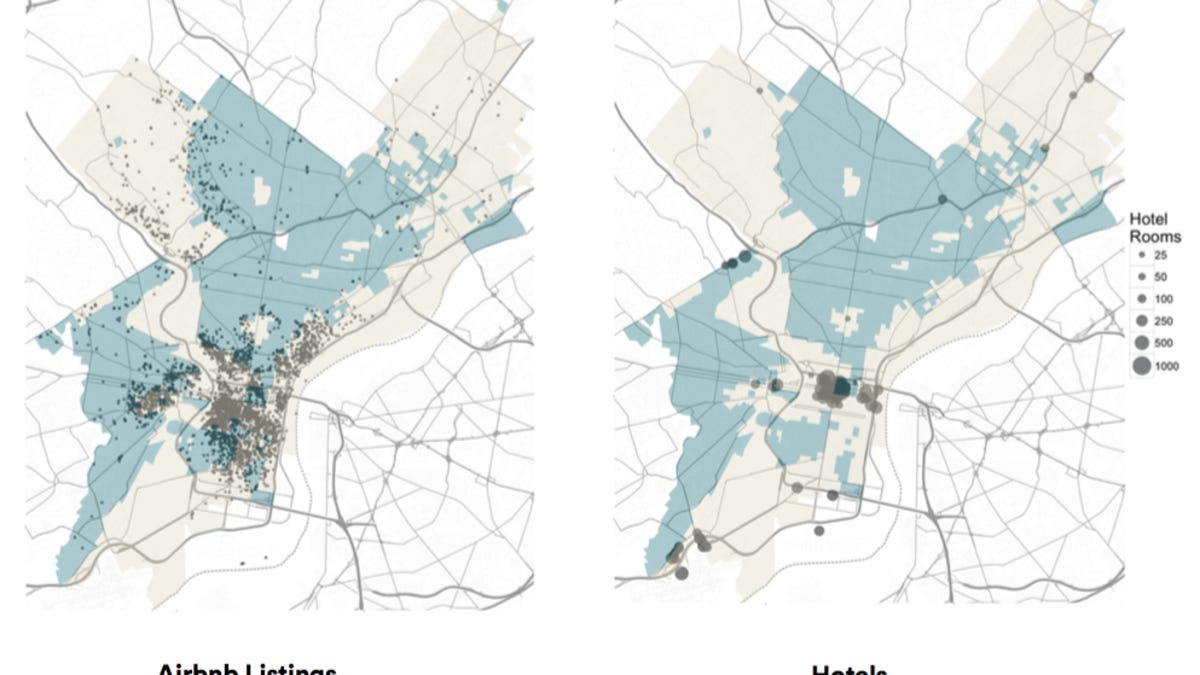Airbnb: We're a positive force in black and Latino neighborhoods
The home-rental company releases a report that says it has a wider reach and more economic impact on communities of color than hotels.
If you were to travel to Philadelphia, the hotels you could stay in would be mostly congregated downtown. The same could be said for Washington DC, New Orleans, San Francisco and most other major cities.
Airbnb says that's why its business is better for black, Latino and other non-white neighborhoods than hotels -- rather than having places clustered in one neighborhood, its rentals are dispersed throughout cities and that brings in more money to those areas.
"The guests are more likely to spend their dollars in the three to four block radius of where they're staying," former Philadelphia Mayor Michael Nutter said in an interview. "It's democratizing the hospitality industry."
Since its founding in 2008, Airbnb has gone from a small startup to having a presence in 34,000 cities in 191 countries. But with that expansion, has come growing pains. The company has been criticized for discrimination on its platform and displacement of long-term tenants. To combat these critiques, Airbnb has been working to show it's the good guy in the hospitality world.
The home-rental company released an 11-page report Friday detailing its spread throughout seven cities. The report shows that Airbnb typically has a higher percentage of rentals in non-white neighborhoods than hotels.
"This is an economic empowerment tool for people in communities of color," Nutter said. "Also there is a ripple effect for not just those hosts but also for the people in those neighborhoods."
Nutter, who chairs Airbnb's Mayoral Advisory Board, is presenting the report to the African American Mayors Association on Friday. The association has 60 members and represents more than 500 African American mayors in the US.
Airbnb's report tallies data from Philadelphia, Washington DC, New Orleans, Baltimore, Chicago, New York and Boston. It says that in total roughly 1 million guests have stayed in Airbnb rentals in communities of color and that about 75 percent of all Airbnb listings are located outside of traditional hotel districts. Additionally, hosts in these areas make anywhere between $3,500 and $7,100 on average per year from renting on Airbnb.
In all cities, stays in non-white neighborhoods were higher with Airbnb than in hotels. For instance, in Washington DC, 7 percent of hotels are in communities of color compared with 40 percent of Airbnb rentals. In other cities the difference was relatively minor, such as Philadelphia where 30 percent of hotels are in non-white communities compared with 32 percent of Airbnbs.
"You can't talk about the impact on a neighborhood without talking about the impact of housing prices," said Rachel Goodman, staff attorney at the Racial Justice Program for the American Civil Liberties Union. "Airnb units have a measurable impact of taking affordable housing out of neighborhoods."
Airbnb's report didn't address how its short-term rentals have affected rent prices and affordable housing in communities of color. It also didn't address the broader issue of discrimination on the platform.
Earlier this year, Airbnb caught flak for discrimination on its platform. Not only did a number of black Airbnb users say their reservation requests on the site were denied, but a Harvard Business School study in January found people with "distinctively African-American names" were 16 percent less likely to be accepted for a rental on Airbnb. This phenomenon led to the birth of Twitter hashtag #AirbnbWhileBlack.
Airbnb has taken steps to rectify its reputation. It enlisted Laura Murphy, former head of the legislative office of the ACLU in Washington DC, to lead a review of the company's platform and practices. In September, Airbnb released a 32-page report on its new nondiscrimination policy with Murphy's recommendations, which included a commitment from hosts to not turn away customers based on their race, religion, nationality, disability, gender or age.
"Airbnb has been more proactive on addressing this discrimination piece," Goodman said. "But there's more to do on that front."
Update, 11:56 a.m. PT: Adds comment from Rachel Goodman, staff attorney at the Racial Justice Program for the American Civil Liberties Union.


